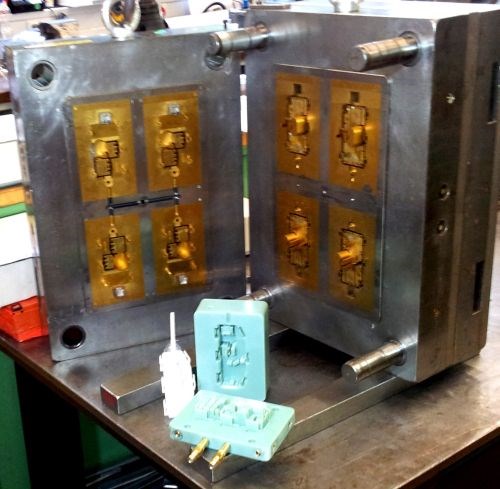Video: Printed Molds Slash Development Costs, Lead Time
When testing prototype injection-molding parts reveals the need for design changes, this manufacturer realizes significant savings by printing new tooling rather than machining it.

Although much of the buzz surrounding additive manufacturing involves its rising potential for end-use production parts, the technology's long-standing advantages for prototyping continue to attract manufacturers into the fold. One of the latest companies to come on board is Robert Seuffer, a German manufacturer that uses 3D printers from Stratasys to dramatically reduce the time and cost of producing injection-molded sample parts.
Stratasys detailed the company’s story in a recent press release, as well as the video above. Seuffer specializes in plastic parts for household appliances and commercial vehicles. Prior to mass production, injection molded parts require testing for performance and fit, often in environments involving moving mechanical parts and high temperatures. Historically, part design changes have required corresponding alterations to the metal injection mold tooling, a scenario that typically involves costly and time-consuming machining work.
Today, that's no longer the case, says Andreas Buchholz, head of research and development at Seuffer. "With Stratasys 3D printing, we can design the first drafts of the injection mold within a few days and 3D print them in less than 24 hours for part evaluation. Traditionally, it would take eight weeks to manufacture the tool in metal using the conventional CNC process. And while the conventional tool costs us about 40,000 euros, the 3D-printed tool is less than 1,000 euros, a saving of 97 percent."
The company also produces 3D-printed molds for its hot melt process. These molds, which are used to overmold low-melting-point polyamide over electronic circuit boards, are created with Stratasys' rigid, opaque Vero materials.
"More and more manufacturers are adopting 3D-printed tools as a complementary injection molding solution--not only to cost-effectively test products before mass production, but also to produce customized parts," says Andy Middleton, General Manager, Stratasys EMEA at Stratasys.
For more content from Stratasys about 3D printing in injection mold applications, click here.
Related Content
-
2021 30 Under 30 Honors Program: Mentoring in the Next-Generation of Moldmaking Professionals
Young professionals are vital to the moldmaking industry, and it is important to acknowledge those making strides in shaping the industry's future. MoldMaking Technology recognizes the industry's young talent through its 30 Under 30 Honors Program.
-
MMT Chats: Acquisition Trends and Lessons for Mold Builders
Jim Berklas is a former full-time M&A lawyer for several of the largest private equity firms in the country and has 25 years of M&A experience and 200 closed transaction. Today, he is founder and M&A Leader with Augmented Industry Services. He joins me for this MMT Chat on mergers and acquisitions trends and strategies within in the mold manufacturing industry. This episode is brought to you by ISCAR with New Ideas for Machining Intelligently.
-
Leading Mold Manufacturers Share Best Practices for Improving Efficiency
Precise Tooling Solutions, X-Cell Tool and Mold, M&M Tool and Mold, Ameritech Die & Mold, and Cavalier Tool & Manufacturing, sit down for a fast-paced Q&A focused on strategies for improving efficiencies across their operations.














_300x250 3.png;maxWidth=300;quality=90)
.jpg;maxWidth=300;quality=90)
